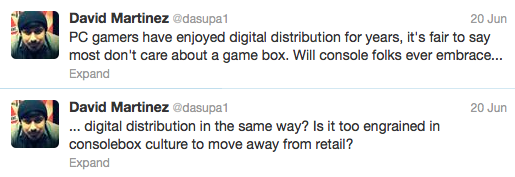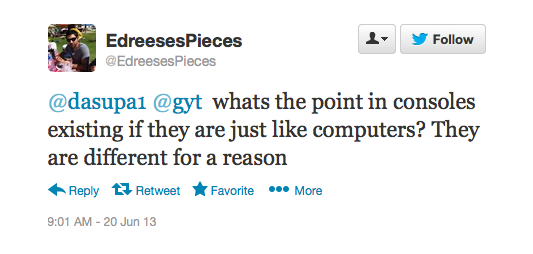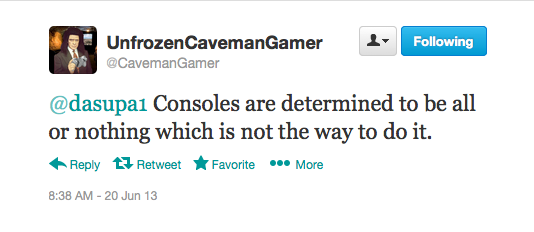 Back to school already? Here are 25 games that will get your brain in shape before you know it. Even if you’re not headed back to the classroom, we can all use a good mental push up (and a fun distraction) from time to time.
Back to school already? Here are 25 games that will get your brain in shape before you know it. Even if you’re not headed back to the classroom, we can all use a good mental push up (and a fun distraction) from time to time.
Frisky Mongoose has compiled a list of 25 top titles for “brainstream” gamers both young and old. Did your favorites make the list? poweRBrands and Empire Avenue are 2 of our favorites, simple because they offer something totally unique and relevant for PR and marketing folks like us. Several – if not most – of these social, mobile and casual games are free, so put on your smarty pants and play learn your hearts out!
poweRBrands by Reckitt Benckiser – “The first Facebook game of its kind, designed to test players’ marketing and business abilities, teach strategy and decision-making skills, and introduce users to the culture and challenges that face the company’s marketers every day.
Brain Buddies by wooga – Brain Buddies offers its users a playful way to determine their brain weight. The game is focusing on a contest among friends to find the one with the heaviest brain. A large set of mini games as well as entertaining graphics make the game fun to play for a long time.
Who Has the Biggest Brain by Playfish – A series of mini games test your abilities in 4 brain areas: Calculation, Memory, Logic and Visual. The combined score from each of these categories add up to your overall brain rating. A great opportunity to settle the debate, who really does have the biggest brain? After playing you are awarded a ranking – one of 27 different ‘Brain Types’ used to rank you and your friends.
Two other studious selections to try from Playfish are Word Challenge and Geo Challenge.
 DumbVille by GSN – Tackle quirky questions and puzzle your way through mindless mini-games to rise through the ranks from Village Idiot to Mayor of Dumbville. Every time you succeed AND every time your friends fail, you’ll win Oodles – redeemable rewards that you can use to purchase sweepstakes entries and prizes on GSN.com.
DumbVille by GSN – Tackle quirky questions and puzzle your way through mindless mini-games to rise through the ranks from Village Idiot to Mayor of Dumbville. Every time you succeed AND every time your friends fail, you’ll win Oodles – redeemable rewards that you can use to purchase sweepstakes entries and prizes on GSN.com.
Scrabble by Electronic Arts – A new version of the original board game includes built-in chat and dictionary, multiple word lists, dynamic animations, and multiple speed settings for public games. An easy-to-use interface lets you play with anyone who loves the game!
Empire Avenue – Reap the benefits of expanding your online influence while buying and selling virtual shares in your best friend, your favorite blogger or that pizza joint down the road – anyone, for free. Connect with other people who like the same things as you, find interesting bloggers to follow, or unearth a cool new business in your home town! This Internet thing is pretty useful, you know, and Empire Avenue helps you find the people and businesses that are relevant to you.
Risk: The Game of Global Domination on Pogo.com – Establish your military objectives, take command of your army and begin your campaign to rule the world. Based on the classic board game of strategic conquest from Hasbro, Risk comes to life online where the object of the game is simple: Global Domination! Risk is a turn based game with each player starting with their own controllable army in an attempt to capture territories from opposing players and control the entire map.
Word Whomp on Pogo.com – This freebie challenges you to whomp adorable gophers and spell as many words as you can from a given set of letters before the clock runs out. Gophers will dig up veggies and bonuses as you unscramble words. Reach the carrot to enter the bonus round and score big!
Jeopardy on GSN.com – Test your trivia knowledge, just like the actual game show. Select a question from one of the six game categories by clicking on a dollar value under the category of your choice. When the question appears, you may choose to either “Respond” or “Pass.” If you choose to respond, you will have 15 seconds to answer a multiple-choice question. The game will end when you don’t have enough money to play on.
Wheel of Fortune on GSN.com – You can compete for cash and prizes, just like contestants on the actual game show, with 5 turns to solve the word puzzle. Correctly identify consonants or “buy a vowel.” Each successful guess gives you an additional free spin, but the faster you solve the puzzle, the higher your time bonus! When you choose to solve the puzzle, if your answer is correct, you’ll play in the Bonus Round. If not, you’ll lose a turn.
Tiny Planets – “Targetting kids aged six to 14, this game is based on the Tiny Planets animated TV series, and offers six ‘planets’ for users to visit consisting of simple games, web videos, social networking, a virtual world, goods, and currency, and, of course, learning opportunities. Tiny Planets is rich with entertaining and educational activities that focus on space, conservation, science, creativity, and critical thinking skills.”
FitBrains.com – Provides scientifically developed brain games targeting the five major brain areas: memory, problem solving, concentration, visual spatial, Language. Focus on one brain area or play all the games to give your brain a complete workout. Brain games are a fun way to exercise your brain and an important pillar in living a healthy life. Try your luck and test your skills in games like Travel Quest, Sum Snap and Uber Brain.
Fantage.com, a TriplePoint client – A next-generation destination site for children that offers games and adventures to entertain, delight, and promote positive social interaction in an engaging, exciting, safe environment that both kids and parents love. Fantage also provides an age-appropriate, safe social networking experience within a fun virtual world.
The Oregon Trail by Gameloft – Assume the role of a wagon leader in a side-view journey where your strategic decisions must ensure the safety of your party along the treacherous Oregon Trail. Overcome the perilous journey to Oregon in America’s Wild West. Just like the real pioneers, experience the decision-making, problem-solving, and role-playing fun of this historical event. A unique strategy/educational game relating the first pioneers’ journey to Western American.
THINK by TriplePoint client, Ravensburger Digital – 16 exercises spread across four distinct categories, all designed to give your mind a rigorous workout in different areas of thought. THINK is currently available in English, Spanish and German. Could your brain use a boost?
RedFish Puzzle by Fresh Planet – “Fun games for smart people.” Fresh Planet offers several brain games on various platforms, including the RedFish series of learning apps for young children on the iPad. RedFish Piano 4 Kids is another good one to check out.
 Words with Friends by Newtoy Inc. – Turn-based crossword gaming in your pocket! Not much else to say, besides this game is Scrabble in your pocket, with your friends, in real time… and it’s as addictive as they come.
Words with Friends by Newtoy Inc. – Turn-based crossword gaming in your pocket! Not much else to say, besides this game is Scrabble in your pocket, with your friends, in real time… and it’s as addictive as they come.
HexaLex by TriplePoint client, Nathan Gray – Takes the classic, easy to learn but hard to master crossword game and adds a new dimension. Hexagonal tiles let you play words in three directions instead of two. Words interact in new and interesting ways. But have no fear, you’ll be up and playing in no time, thanks to the tutorial and detailed, built-in help. If you’ve ever played Scrabble, Lexulous, or Words With Friends you’ll feel right at home!
Word Warp by MobilityWare – Word game fans rejoice! Similar to Text Twist, Word Warp is a challenging anagram type of word game in which you try to form as many words as you can out of the six letters you are given before time runs out. You will receive points for each correct word, but in order to advance to the next level you must come up with at least one word that uses all six letters.
Word Scramble 2 by Zynga – Scramble is the fast fun game of finding words in a jumbled grid. Quickly slide your finder over letters next to each other to make words! Compete with friends and play live with fellow word game fans.
Big Brain Academy (Wii and DS) by Nintendo – Weigh Your Brain! With 15 activities that challenge your brain in single-player Test and Practice modes, Big Brain Academy Wii sees how you measure up in five categories: memory, analysis, number crunching, visual recognition, and quick thinking.
(Wii and DS) by Nintendo – Weigh Your Brain! With 15 activities that challenge your brain in single-player Test and Practice modes, Big Brain Academy Wii sees how you measure up in five categories: memory, analysis, number crunching, visual recognition, and quick thinking.
My Word Coach (DS) by Ubisoft – Developed in collaboration with linguists, helps players improve their verbal communication and vocabulary in a fun way. Practice need never get boring with six different exercises to choose between. Players can input missing letters from words, spell out the answers to various definitions, choose which word matches a particular definition, form specific words with Scrabble-like tiles, and more. Three levels of difficulty are available, and the game includes a built-in dictionary of over 17,000 words.
(DS) by Ubisoft – Developed in collaboration with linguists, helps players improve their verbal communication and vocabulary in a fun way. Practice need never get boring with six different exercises to choose between. Players can input missing letters from words, spell out the answers to various definitions, choose which word matches a particular definition, form specific words with Scrabble-like tiles, and more. Three levels of difficulty are available, and the game includes a built-in dictionary of over 17,000 words.
Personal Trainer: Math (DS) by Nintendo – Makes learning fun with fast-paced, high-speed arithmetic problems that keep your math basics fresh, from addition to subtraction and multiplication to division. As your calculation speed improves, earn medals in each exercise to prove your mathematical mastery!
(DS) by Nintendo – Makes learning fun with fast-paced, high-speed arithmetic problems that keep your math basics fresh, from addition to subtraction and multiplication to division. As your calculation speed improves, earn medals in each exercise to prove your mathematical mastery!
My Virtual Tutor: Reading Kindergarten to 1st Grade (DS) by Mentor Interactive – By combining the kid-friendly Nintendo DS with a proven reading curriculum developed and tested at the University of Colorado, My Virtual Tutor: Reading makes learning reading skills fun, affordable and portable. Through interactive books, school age and grade relevant phonics instruction and fun quiz modes, your child will learn the comprehension, phonics, fluency and vocabulary necessary to become an expert reader, all while having fun with their Nintendo DS.
(DS) by Mentor Interactive – By combining the kid-friendly Nintendo DS with a proven reading curriculum developed and tested at the University of Colorado, My Virtual Tutor: Reading makes learning reading skills fun, affordable and portable. Through interactive books, school age and grade relevant phonics instruction and fun quiz modes, your child will learn the comprehension, phonics, fluency and vocabulary necessary to become an expert reader, all while having fun with their Nintendo DS.
Brain Age (DS) by Nintendo – The title is a series of minigames designed to give your brain a workout. The 17 engaging activities are all designed to help work your brain and increase blood flow to the prefrontal cortex. Whether you’re playing simple songs on a piano keyboard or monitoring the photo finish of a footrace, you’ll love your new mental workout!
(DS) by Nintendo – The title is a series of minigames designed to give your brain a workout. The 17 engaging activities are all designed to help work your brain and increase blood flow to the prefrontal cortex. Whether you’re playing simple songs on a piano keyboard or monitoring the photo finish of a footrace, you’ll love your new mental workout!
This article was originally published by Kate Hancock on Frisky Mongoose.









 Back to school already? Here are 25 games that will get your brain in shape before you know it. Even if you’re not headed back to the classroom, we can all use a good mental push up (and a fun distraction) from time to time.
Back to school already? Here are 25 games that will get your brain in shape before you know it. Even if you’re not headed back to the classroom, we can all use a good mental push up (and a fun distraction) from time to time.





